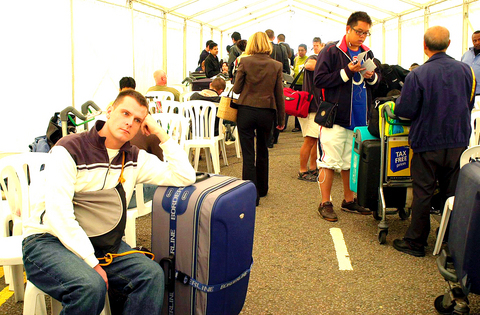Tens of thousands of air travellers faced another day of chaos yesterday after British Airways cancelled all its flights in and out of London's main Heathrow airport because of a wildcat strike.
It cancelled all its British, European and long-haul flights at the world's busiest international airport Thursday after baggage handlers walked out in sympathy with workers at the catering firm that prepares its in-flight meals.
With no immediate end to the dispute in sight, and with 100 aircraft and 1,000 pilots and cabin crew left stranded elsewhere around the world, British Airways said it would remain grounded yesterday.

PHOTO: EPA
"It is a huge disappointment to us that we have become embroiled in someone else's dispute," said British Airway's chief executive Sir Rod Eddington.
British Airways operates some 550 flights a day at Heathrow at this time of year -- traditionally one of the busiest weeks for the airline industry, with legions of holidaymakers taking to the air.
As passengers arrived on Thursday to discover that they had been shut out of Heathrow's terminals, airport staff distributed fold-up chairs and bottles of water, and a race was on to find overnight accomodation for out-of-towners.
The chaos stems from the sacking of 800 workers from Gate Gourmet, an in-flight catering firm owned by a Texas investment group that counts British Airways as its biggest client at Heathrow, west of London.
Gate Gourmet said the layoffs were necessary for its survival, but the Transport and General Workers Union accused management of acting in a "disgraceful" fashion and urged British Airways to put pressure on it.
The dispute escalated sharply Thursday when baggage handlers, members of the same union, staged a spontaneous unofficial strike in support of their Gate Gourmet colleagues.
Besides British Airways, the walkout had a direct impact on Australian carrier Qantas, Finnair and Sri Lankan Airways, which depend on the same baggage handlers at Heathrow.

RESILIENCE: Deepening bilateral cooperation would extend the peace sustained over the 45 years since the Taiwan Relations Act, Greene said Taiwan-US relations are built on deep economic ties and shared values, American Institute in Taiwan (AIT) Director Raymond Greene said yesterday, adding that strengthening supply chain security in critical industries, enhancing societal resilience through cooperation and deepening partnerships are key to ensuring peace and stability for Taiwan in the years ahead. Greene made the remarks at the National Security Youth Forum, organized by National Taiwan University’s National Security and Strategy Studies Institution in Taipei. In his address in Mandarin Chinese, Greene said the Taiwan-US relationship is built on deep economic ties and shared interests, and grows stronger through the enduring friendship between

GAINING STEAM: The scheme initially failed to gather much attention, with only 188 cards issued in its first year, but gained popularity amid the COVID-19 pandemic Applications for the Employment Gold Card have increased in the past few years, with the card having been issued to a total of 13,191 people from 101 countries since its introduction in 2018, the National Development Council (NDC) said yesterday. Those who have received the card have included celebrities, such as former NBA star Dwight Howard and Australian-South Korean cheerleader Dahye Lee, the NDC said. The four-in-one Employment Gold Card combines a work permit, resident visa, Alien Resident Certificate (ARC) and re-entry permit. It was first introduced in February 2018 through the Act Governing Recruitment and Employment of Foreign Professionals (外國專業人才延攬及雇用法),

The Ministry of Transportation and Communications yesterday said that it would redesign the written portion of the driver’s license exam to make it more rigorous. “We hope that the exam can assess drivers’ understanding of traffic rules, particularly those who take the driver’s license test for the first time. In the past, drivers only needed to cram a book of test questions to pass the written exam,” Minister of Transportation and Communications Chen Shih-kai (陳世凱) told a news conference at the Taoyuan Motor Vehicle Office. “In the future, they would not be able to pass the test unless they study traffic regulations

EUROPEAN TARGETS: The planned Munich center would support TSMC’s European customers to design high-performance, energy-efficient chips, an executive said Taiwan Semiconductor Manufacturing Co (TSMC, 台積電), the world’s largest contract chipmaker, yesterday said that it plans to launch a new research-and-development (R&D) center in Munich, Germany, next quarter to assist customers with chip design. TSMC Europe president Paul de Bot made the announcement during a technology symposium in Amsterdam on Tuesday, the chipmaker said. The new Munich center would be the firm’s first chip designing center in Europe, it said. The chipmaker has set up a major R&D center at its base of operations in Hsinchu and plans to create a new one in the US to provide services for major US customers,